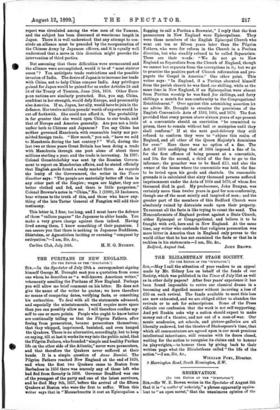THE PURITANS IN NEW ENGLAND.
[TO THE EDITOR OF THE "SPECTATOR.")
SIR,—In the Spectator of July 29th a correspondent signing himself George M. Drought sent you a quotation from some one whom he describes as "a well-known American writer," vehemently assailing the Puritans of New England. Perhaps you will allow me brief comment on his letter. He does not give the name of the writer he quotes ; we have therefore no means of comparing dates, verifying facts, or consulting his authorities. To deal with all the statements advanced, and especially the misstatements, would require more space than you can possibly allow me. I will therefore confine my- self to one or more points. People who ought to know better are continually telling us that the Pilgrim Fathers, after fleeing from persecution, became persecutors themselves; that they whipped, imprisoned, banished, and even hanged the Quakers. There is no alternative, accordingly, but to keep on saying, till at last it works its way into the public mind, that the Pilgrim Fathers, who founded "simple and healthy Puritan
• life on the other side of the Atlantic," never were persecutors, and that therefore the Quakers never suffered at their hands. It is a simple question of Anno Domini. The Pilgrim Fathers reached New England at the end of 1620, and when the first two Quakers came to Boston from Barbadoes in 1656 there was ic,arcely any of those left who had fled from Scrooby in 1608. Governor Bradford was one of the youngest of the party and one of the latest survivors, and he died May 9th, 16,57, before the arrival of the fifteen Quakers at Boston who were the first to suffer. When this writer says that in "Massachusetts it cost an Episcopalian a flogging to call a Puritan a Brownie," I reply that the first persecutors in New England were Episcopalians. They were those members of the English Episcopal Church who went out ten or fifteen years later than the Pilgrim Fathers, who were for reform in the Church in a Puritan direction, but who steadily refused to be called Separatists. These are their words : "We do not go to New England as Separatists from the Church of England, though we cannot but separate from the corruptions in it; but we go to practise the positive part of Church reformation and pro- pagate the Gospel in America." One other point. This writer says : "In England, if a Puritan absented himself from the parish church he was fined one shilling, while at the same time in New England, if an Episcopalian were absent from Puritan worship he was fined five shillings, and forty shillings a month for non-conformity to the Congregational Establishment." Over against this astonishing assertion let me advise Mr. Drought to examine the provisions of the English Conventicle Acts of 1593, 1664, and 1670. The first provided that every person above sixteen years of age present at a conventicle should on conviction "be committed to prison, there to remain without bail or mainprise until they shall conform." If at the next gaol-delivery they still refused to conform they were to "abjure this realm of England, and all other of the Queen Majesty's dominions for ever." Here there was no option of a fine. The Act of 1670 modifying that of 1664 imposed a fine of 5s. for the first offence of being present at a conventicle, and 10s. for the second, a third of the fine to go to the informer; the preacher was to be fined 22), and also the owner of the house where the conventicle was held, the fine to be levied upon his goods and chattels. On reasonable grounds it is calculated that sixty thousand persons suffered imprisonment under the Acts of 1664 and 1670, of whom five thousand died in gaol. My predecessor, John Banyan, was certainly more than twelve years in gaol for non-conformity, though one of the most saintly and inspired of men ; and the greater part of the members of this Bedford Church were absolutely ruined by distraints made upon their property. To recount all the facts is like trying to count the sand. The Nonconformists of England protest against a State Church, either Episcopal or Congregational, and believe it to be fraught with evil, here and in New England. At the same time, any writer who contends that religions persecution was more bitter in America than in England only proves to the world either that he has not examined the facts or that he is reckless in his statements.—I am, Sir, &c., Bedford, August 2nd. Joan BnowN.


































 Previous page
Previous page